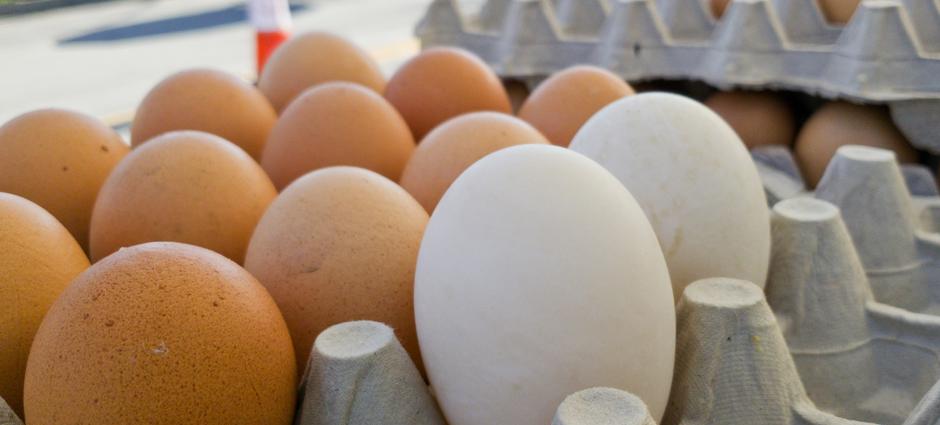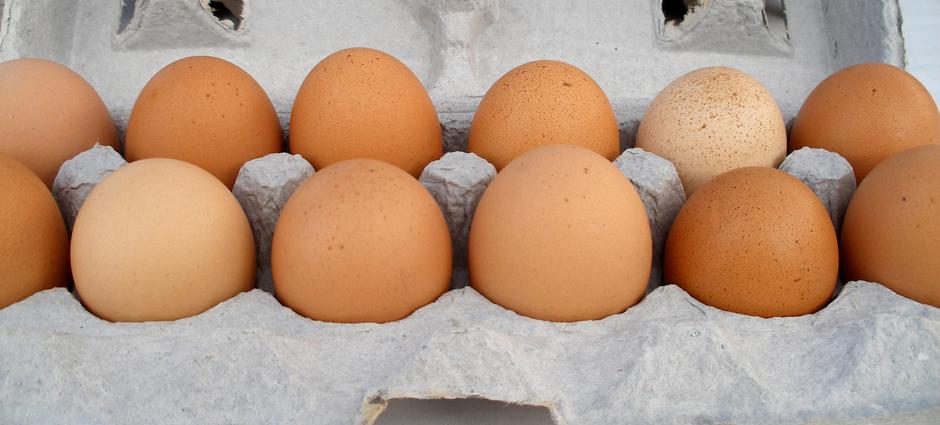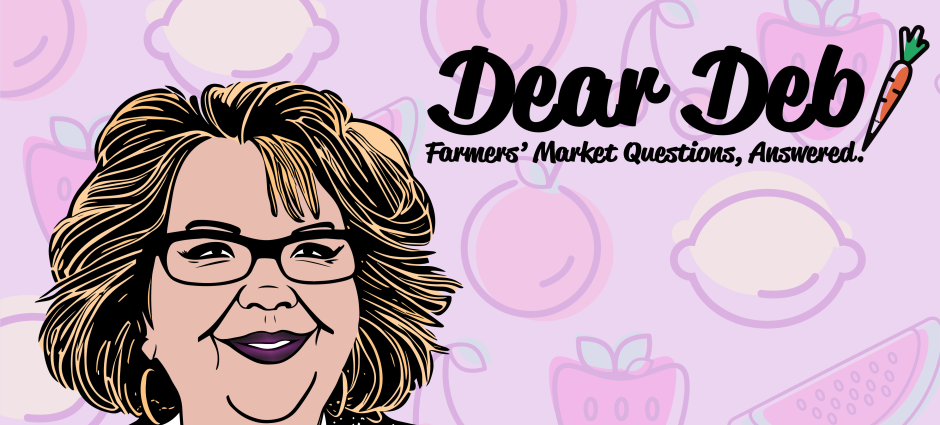Unscrambling Egg Terminology
Do happy, stress-free chickens that munch on bugs, seeds, and grass produce better eggs? Does it matter if they’re fed grain or are antibiotic-free? If you are concerned about where your eggs come from, about the welfare of the hens, and what they’re fed, then it does matter. Your local farmers’ market is the best place to find eggs that are from chickens that are pasture-raised, humanely treated, and enjoy life out in the open.
Here are some terms associated with egg production that you should become familiar with, in order to know what it is that you’re purchasing:
Conventional: Egg-laying hens that live in “battery cages,” cramped mesh cells that prevent hens from ever stretching their wings, nesting, or doing much of anything except lay eggs. Seven or eight birds sometimes share a single cage. The good news is that California outlawed the wire cells in 2008. But you might be purchasing eggs from other states that don’t have this law.
Free-range: Some free-range chickens roam freely on green fields, but other chickens can only access a screened-in porch. It depends on the farm. Under the current USDA free-range certification standards, there are no requirements dictating the amount of time hens must spend outside, the minimum allowable size of indoor or outdoor environments, or any specific range area characteristics such as ground cover material or foraging opportunities.
Cage-free: Cage-free chickens are allowed to roam freely inside their warehouse. According to Proposition 12, which passed in 2018, hens would require a square foot of floor space each, with the additional requirement that they are kept “totally cage-free” by 2022. Clara’s Egg Farm from Royal Oaks offers cage-free eggs.
Pastured: Pasture-raised hens live outdoors and eat a diet of seeds and insects. Shelly McMahon of Shelly’s Farm in Brentwood says, “We have always raised our hens on pasture. We believe the hens are healthier and happier when allowed to forage naturally. It is more work and requires more land but it is worth it for the welfare of the hens.” Stueve Farms in Oakdale and Alexandre Family Farm near Crescent City also have pasture-raised chickens.
No added hormones: The FDA has banned the use of hormones in poultry production.
Antibiotic Free: Even though antibiotics are common in chicken feed, egg-laying hens rarely get medicated with antibiotics. The FDA only approves three types of antibiotics for egg-laying flocks and even if hens are treated with antibiotics, their eggs shouldn’t be affected. Antibiotics can cure sick chickens of deadly respiratory infections or E. coli.
Humane: To be Certified Humane, farmers who raise laying hens must abide by a host of rules that ensure chickens live in decent conditions. There needs to be airflow and a comfortable litter material to build nests. Hens are also given boxes of dirt to roll around in. Chickens naturally do something called “dust-bathing” to prevent lice and other parasites. The Certified Humane Program certification is assigned under the Humane Farm Animal Care (HFAC). At the farmers’ market, you can find Certified Humane eggs from Shelly’s Farm.
Animal Welfare Approved: This designation goes a few steps further with pasturing and is considered the most rigorous animal welfare certification. Certified Animal Welfare Approved is the most rigorous animal welfare accreditation and certified by A Greener World (AGW),
Natural: This is just a marketing term that means nothing in terms of how an egg is produced or how a chicken is treated.
Organic: The USDA says organic eggs must come from free-range chickens fed with 100% organic feed, meaning no administered antibiotics, no hormones, no arsenic, and no poultry-slaughter byproducts.
Brown vs white (or blue) eggs: The color of the shell has nothing to do with the flavor of the eggs. It just means they are just different breeds of chickens. For instance, an Araucana chicken will lay lovely turquoise blue eggs, the Favaucana chicken lays sage-green eggs, and the Maran hen lays brown eggs.
At your farmers’ market you will also find eggs other than those produced by chickens and hard to find:
- Duck eggs, are larger and often described as richer and creamier than chicken eggs.
- Pullet eggs, the first eggs that young hens lay, are smaller in size, but richer in taste as they have a higher proportion of yolk to egg white.
- Quail eggs, very small with a speckled shell and rich in flavor, are considered a delicacy in many countries.
- Balut*, a fertilized duck egg that is considered a delicacy in the Philippines and is larger. Farmers’ Market Manager Alec Carolan recently tasted a balut egg and said it tastes the same as a chicken egg, but has a richer flavor and different, almost thicker, texture.
If it matters to you where and how your eggs are produced, visit the farmers’ market and talk to the farmers who sell eggs about their methods of raising egg-laying chickens. As inexpensive a protein as eggs are, if you have to pay a dollar or two more than usual, you’ll know you’ve spent money wisely on eggs from chickens who have been treated humanely.


